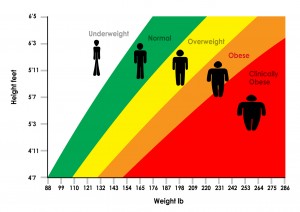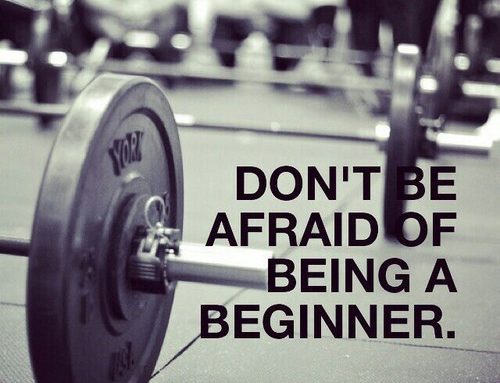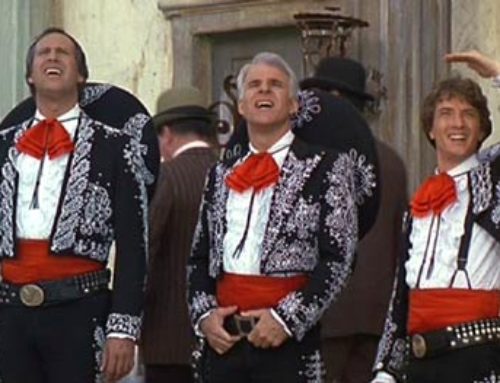I think we all have a perspective of what body type or weight we consider healthy or fit. Recently, I have been challenging my own perceptions of visual health and fitness. Through reading several studies on body weight, BMI, health and fitness factors, it has changed how I approach other people inside and outside of the gym. Of course, everyone wants a fit, hard body with lots of muscle mass and low body fat.
BMI has been used as an indicator of health for a long time. Some disagree with the use of it as an accurate measure of health and fitness. BMI is calculated from your height and weight. BMI is an estimate of body fat and can be a gauge of your risk for diseases that can occur with more body fat. The higher your BMI, the higher your risk for certain diseases such as heart disease, high blood pressure, type 2 diabetes, gallstones, breathing problems, and certain cancers.
Some of the shortcomings of the BMI are that it can overestimate body fat in athletes and others who have a muscular build.
It may also underestimate body fat in older persons and others who have lost muscle. So as a single indicator without other variables to measure, it is less accurate in predicating health and fitness. If one combines BMI, waist circumference and risk factors, health risk can be more accurately determined.
What about using BMI by itself as a predictor of longevity or reduced mortality? A recent article published in the Journal of the American Medical Association(JAMA) reports that being slightly “overweight” may lead to a longer life. “Overall, people who were overweight but not obese were 6% less likely to die during the average study period than normal-weight people. That advantage held among both men and women, and did not appear to vary by age, smoking status, or region of the world.” The study looked only at how long people lived, however, and not how healthy they were when they died, or how they rated their quality of life. Remember, longer life doesn’t necessarily indicate better quality of life.
“The somewhat surprising conclusion comes from an enormous, detailed review of over 100 previously published research papers connecting body weight and mortality risk among 2.88 million study participants living around the world. The new research confirms that obese people, and particularly those who are extremely obese, tend to die earlier than those of normal weight. But the findings also suggest that people who are overweight (but not obese) may live longer than people with clinically normal body weight.” Overweight is defined as having a BMI of between 25-29.9.
BMI Calculation Table:
Underweight = <18.5
Normal weight = 18.5–24.9
Overweight = 25–29.9
Obesity = BMI of 30 or greater
As a quick experiment, my wife and I both calculated our BMI. My BMI is 26.5 and hers is 22.7. So, according to this study, I should live longer and have a lower mortality rate. Interesting, huh? My BMI is elevated most likely due to a higher concentration of muscle mass to overall bodyweight which may confirm one of the issues with using BMI as a health or fitness indicator in athletes. I recommend the use of body composition testing to determine lean to fat mass ratios as a more accurate indicator. A recent study reported that men who had higher muscle mass indexes had improved longevity.
So what does all this mean to the master’s athletes? The over-arching principle here is that a balance of body mass (more muscle than fat) and lifestyle produces improved longevity and quality of life. Being cachectic, skinny fat, or too large, is not healthy and produces less longevity. Maybe being totally ripped, even though it is most pleasing to the eye, may not be as healthy as we thought. Or maybe we should be looking deeper and assessing actual body fat to muscle mass ratios as a more accurate indicator. Also, we know that factors that influence longevity are more complicated than just the BMI. Genetics, lifestyle habits, environmental factors and economic means are all variables that influence longevity. More research obviously needs to be performed. In the meantime, my recommendation is don’t sweat the 5lbs. that you so desperately want to lose. It may be keeping you healthier and allow you to live longer! I’ve always liked a little more than less mass anyway.
Things to remember…
- Don’t worry about that extra 5 lbs if you are meeting your health and fitness goals
- Increasing muscle mass has a direct correlate to increasing longevity
- Being under weight or obese may decrease your longevity
Coach D
- Muscle Mass Index As a Predictor of Longevity in Older Adults Preethi Srikanthan, MD, MS,a Arun S. Karlamangla, MD, PhDb. American Journal of Medicine.
- Being Overweight is Linked to Lower Risk of Mortality. Time Magazine.





Leave A Comment